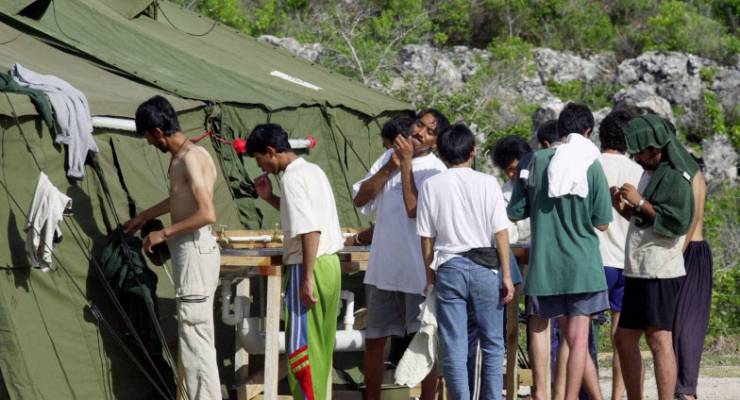
After a nightmare few months of medical alarms on Nauru, Prime Minister Scott Morrison has signalled a willingness to accept New Zealand’s outstanding resettlement offer in exchange for the Senate passing a lifetime ban on people seeking asylum by boat.
The tentative offer, largely brought about by what Australian Medical Association President Tony Bartone calls “a humanitarian emergency requiring urgent intervention” on Nauru, stalled yesterday when the Coalition rejected a Labor compromise to apply the ban only to refugees sent to New Zealand.
Here’s what we know about the bill, the legal context, and what could be Australia’s largest blanket immigration ban since the White Australia policy.
The original plan
In late 2016, then-prime minister Malcolm Turnbull and Home Affairs Minister Peter Dutton announced plans to change the Migration Act to ban any adult sent to Nauru or Manus Island since July 19, 2013 (the day Kevin Rudd announced his resettlement ban) from ever being settled in Australia, even on a spouse, business or tourist visa.
The Migration Legislation Amendment (Regional Processing Cohort) Bill 2016 was shortly passed by the House of Representatives, creating new “visa bars” for everyone over the age of 18 sent to Manus Island and Nauru since Rudd’s announcement, as well as people who had tried to seek asylum but chose to return home. The ban would not apply to children, or people who had arrived via boat after July 2013 who were not sent to offshore detention.
Following criticism from the United Nations, lawyers and activist groups that a migration ban would contravene discriminatory prohibitions in the Refugee Convention and possibly be unconstitutional, Opposition Leader Bill Shorten rejected the bill, calling it a move to appease the “extreme right-wing of Australian political opinion”.
The bill was also opposed by the Greens and some crucial Senate crossbenchers, and over the next seven months just kind of fell off the government’s agenda. Then-senator Nick Xenophon even confirmed to Fairfax Media he was prepared to negotiate but had not been approached by the government.
The current push
Since failing to get the lifetime ban bill through, the Coalition has organised the America resettlement deal (subject to Trump’s similar ban on Iranian and Somali refugees), continued to reject New Zealand’s 2013 offer to resettle 150 offshore detainees per year, and presided over an unprecedented level of child and adult trauma in offshore detention.
After being ejected by the Nauruan government last month, Médecins Sans Frontières (Doctors Without Borders) offered harrowing recollections of systemic mental illnesses, child suicide attempts, and “resignation syndrome”, where children withdraw from food, water, speaking and leaving bed, resulting in at least one case of organ failure. MSF’s calls to evacuate detainees has been echoed by the Australian Medical Association, the International Committee for the Red Cross, the UNHCR, the Greens and crossbenchers pushing a new evacuation bill, and even three Liberal MPs last week.
Since then, Morrison has indicated (but not definitively stated) that he could accept New Zealand’s offer in exchange for the original lifetime ban, a bargain reminiscent of his 2014 trade for expanded immigration powers in return for children out of on-shore detention.
While Shorten maintains the ban is not necessary, Labor announced yesterday that it was prepared to accept the deal under three conditions: the Coalition accept New Zealand’s offer and guarantee children and families are evacuated from Nauru; the ban only apply to the cohort sent to New Zealand; and the legislation’s application is limited to the Special Category Visa (subclass 444) enabling open travel of New Zealand citizens, which would they argue result in a similar agreement with the US cohort.
This was shot down by Morrison yesterday, who, in an odd turn of phrase for a government literally bargaining with human lives, announced “you don’t horse-trade on border protection”.
Where are we now?
Crucially, the government’s bill would still apply to those who sought asylum by boat post-2013, including not just the remaining 1300 Manus Island and Nauru detainees but refugees resettled in the United States, people either forcibly or voluntarily returned to their country of origin, and people brought to Australia or Taiwan for medical treatment.
According to Jane McAdam, director of the UNSW Kaldor Centre for International Refugee Law, even under Labor’s amendments, the New Zealand ban would be in breach of the existing Trans-Tasman agreement, basic principles of non-discrimination, and, in banning family reunions in Australia, disrupt the “fundamental legal principle of family unity”.
The plan to create two-tiers of New Zealand citizenship has also been criticised by New Zealand’s Foreign Minister Winston Peters, who announced last week the government would have to revisit the offer “if we end up with people who are second-class citizens in New Zealand”.
There’s also the fact the government’s current commitment to turnbacks means the New Zealand “loophole” argument is basically moot, and that, as Dutton admitted in estimates, current flagging technologies mean there is no operational need for a legislated ban.
Still, it should be noted that, with the exception of family reunions, a number of detainees would be perfectly happy to live in New Zealand and voluntarily never come to Australia. Which, considering what we’ve put them through, seems more than fair.








I’ve been wondering this for years: if the boat turnbacks are so wonderfully effective, why do we need to keep anyone on Manus or Nauru? Why not draw a line under the whole era and process them here? How would that restart the boats?
The only conclusion, if you accept boat turnbacks are working, is that our politicians prioritise the appearance of toughness over the alleviation of suffering. This is the type of defective human being the careerist takeover of politics delivers us as MPs. Disgusting, empathy-free cowards.
Peter Van Onselen made the same point to Terry Barnes on The Drum last night. He asked, twice (unanswered both times) how it was that Howard was able to settle all the Tampa refugees without restarting the people smuggling trade.
Since Howard likes to keep involved in politics when it suits (eg campaigning for Sharma last week), why don’t Morrison and Dutton ask him how he did it and then do the same? They could even appoint him Envoy to advise on it.
Consider as a classic example of the nature of our current head of government Morrison’s ruthless emotional blackmail regarding the mental health of the refugees and asylum-seekers that remain in the Nauru concentration camp.
To regard morrison a simply another politician not only dangerously underrates what I would certainly describe as his proclivity for evil, but also his skill in exploiting it to his advantage. A concerted hater traitor Rightist political and media campaign that has long vilified refugees has naturally been very much to the advantage of someone seemingly without any moral compass.
Having supported the concentration camps and their aim, having supported poor medical care and consistent obstructionism to medical evacuations, morrison now claims “You don’t horse-trade on border protection. You don’t do it. Because you run the risk of creating a perverse incentive … I’m not here to horse-trade on children. I’m here to help them.” A “lifetime ban” is to be for all asylum-seekers, yet asylum-seekers are now automatically extraordinarily rendered straight back to their torturers. Admittedly, “The Conversation” still seems to apply a global lifetime ban to commenters as a first rather than last punishment.
Observe how he caps his utter lack of compassion by accusing Labor of obstructionism so as to wring further political advantage from their suffering! He knows perfectly well that Parliament could not pass any law until it sits in three week’s time.
As any benefits recipient, wage-earner, or child-care user will know, morrison applies exactly the same approach to us. In that, he is indeed democratic.
Here’s one way it works. For the purpose of the exercise, my name is Attar Farouk and I am a refugee on Nauru. I go to New Zealand under this deal that Morrison is proposing. In five years, I get NZ citizenship. A year later I go through the legal process of changing my name to Scott Dutton or, for greater anonymity, John White or Peter Smith. I then apply for a NZ passport in my new name, and jump on a plane to Australia.
Unless Australia’s Border Force is monitoring all changes of name in NZ and then cross-matching those for all NZ entrants into Australia – in I go. In the unlikely event that ABF is actually monitoring all name changes in NZ, I reckon all the John Whites or Peter Smiths are going to get pretty cranky for being singled out for investigation by ABF.
Tatar or John will carry a NZ passport that shows his place of birth as, for example, Kandahar. So Australian Immigration will only need to query all the John Smiths born in Kandahar.
Sorry, I typed Attar. The predictive text changed it to Tatar.
Rais – good point. I didn’t give that a thought. Bugger.
Touching commitment to discussing this issue, but just why would they particularly want to come to Australia if they’ve become part of New Zealand?
morrison is not seeking this law because it is necessary, or even useful; he wants it to further crush the status of the refugees and to be seem to be wringing concessions from Labor. It is disgusting, grubby politics by a disgusting, grubby party.
In fact, OZ/NZ share all such information currently.
This includes minor convictions which is why so many Kiwis who fail to tick the appropriate box on their landing cards suddenly find their “invisible” 444 visa cancelled at the Primary Line and end up on the next flight back to the Shaky Isles.
I assume that the people smugglers have not micro-chipped these refugees so that they can be traced across the face of the earth. Does Morrison argue that these refugees in the years to come (now with NZ citizenship) are likely to be voluntarily communicate their movements to people smugglers so that they may be used as bait to entice more refugees to take to leaky boats? Why are we paying so much maintaining an elaborate Border Force if “taking the sugar off the table” policy actually works and the boats have stopped as claimed?
I don’t see what the proposal has got to do with NZ law. Viewers of the Border Protection show on TV, or even people who’ve followed the au pair saga, know that entry can be refused by border officials for all sorts of reasons.